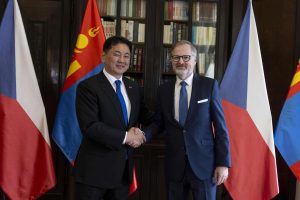This year marks the 75th anniversary of diplomatic relations between Mongolia and Czechia. In celebration of the anniversary, in March Mongolian President Khurelsukh Ukhnaa paid a state visit to Czechia, where the two countries elevated their relations to a Comprehensive Partnership level. The upgrade honors a decades-old historical bonds while strengthening economic mechanisms that will help Mongolia and Czechia to navigate the geopolitical shifts in Europe.
On April 25, 1950, Mongolia and Czechoslovakia (which later split into the independent states of Czechia and Slovakia) established diplomatic relations. At the time, Czechoslovakia was among five European nations that established diplomatic ties with Mongolia, along with Poland, Romania, Bulgaria, and East Germany.
Mongolia and Czechia shared a similar transition from socialist states to robust democracies. Czechia’s political history as part of the Soviet-led Eastern Bloc made its democratic transition as challenging and time consuming as Mongolia’s democratization, although neither was part of the USSR. Today, both countries rank high in Freedom House’s Freedom in the World report, with Czechia scoring 95 out of 100 and Mongolia receiving 84 out of 100.
Following the dissolution of the Soviet Union and Mongolia’s democratization, Mongolia recognized the Czech Republic in 1993 as an independent state. Despite these historical turning points, Mongolia and Czechia’s official diplomatic relations are officially dated back to 1950. Hence, marking the 75th anniversary shows the historical depth of the relationship but also carries strong symbolism for independence and sovereignty.
In commemoration of the Czechia-Mongolia diplomatic anniversary, President of the Czech Republic Petr Pavel invited his Mongolian counterpart for a state visit. During Khurelsukh’s four-day state visit to Prague in March, the two countries advanced bilateral ties at the highest level of the government. During Khurlsukh’s state visit, the Mongolian delegation also held high-level meetings with Czech Prime Minister Petr Fiala and Senate President Miloš Vystrčil.
“This historic visit – the first in a decade – underscores the Czech Republic’s growing importance as Mongolia’s ‘third neighbor,’” Czech Ambassador to Mongolia Jan Vytopil told The Diplomat. “We are experiencing the best period in Czech-Mongolian relations in decades [and] the highest trade exchange in 25 years.”
Since establishing diplomatic ties, Czech investments have contributed to the development of Mongolia’s mining sector, constructing key industrial facilities such as the Bayan-Ölgii transmission tower, cement plants, and hospitals in Mongolia. Czech geologists and experts helped discover the Erdenet copper deposit – one of Mongolia’s most significant mineral resources.
Vytoptil noted that Czechs have played a key role in Mongolia’s development, contributing to important investments and major projects such as the discovery of copper deposits in Erdenet, the construction of Mongolia’s Hospital No. 1 (the country’s largest), as well as the development of the leather and shoe industry. The newly established Comprehensive Partnership and the signing of multiple agreements covering security, education, agriculture, environment, and sports cooperation will further boost bilateral cooperation.
In support of expanding business relations between the two countries, the Mongolia-Czechia business forum was held during Khurelsukh’s visit. The forum, which gathered around 150 companies, explored new opportunities for trade and investment, particularly in the fields of technology, renewable energy, and logistics and, resulted in business contracts worth over $6.3 million. Memorandums and agreements to advance agricultural collaboration and technology exchange will help grow Mongolia’s presence in the European market, particularly with regards to livestock products.
Mongolia’s upgrade in bilateral relations with Czechia is an illustration of Ulaanbaatar’s expanding “third neighbor” ties. Mongolia’s third neighbor policy supports strengthening economic cooperation with partner countries beyond the two states it directly borders, China and Russia. An important element of the policy is the quest for economic diversification through access to other markets – in this case, the European Union and Europe more broadly.
Czechia has been a member of the EU since 2004, and its strong economic relations with the bloc make the country a gateway Ulaanbaatar can utilize. As of 2023, 81.4 percent of Czech exports went to fellow EU member states, and the EU provided 72.8 percent of Czechia’s imports. Czechia’s strong trade networks with the EU can be beneficial to Mongolia’s third neighbor export goals.
Ambassador of Mongolia to Czechia Gansukh Damdin noted that Mongolia and Czechia will intensify their cooperation within the framework of the EU-Mongolia partnership, including the Global Gateway. Their agreement on education will further support the scholarship program “Mission 2100” for Mongolian students to obtain higher education in Czechia.
To Czechia, Mongolia’s mining and agricultural sector is of great importance. In March, Ulaanbaatar and Prague signed a three-year agreement on geological cooperation that involves a “geological mapping and general prospecting… in selected areas in Munkhkhairkhan, Zereg, and Mankhan soums of Khovd aimag and the Mongolian Altai sites.” Czechia is also among the first countries to invest in Mongolia’s uranium sector.
Beyond the economic aspect, high-level state visits and the establishment of comprehensive partnerships are designed to uphold Mongolia’s geopolitical equilibrium, balancing between Russia and China while reinforcing Mongolia’s unique diplomatic and economic position. Mongolia’s pro-engagement foreign policy has managed to cultivate a diplomatic niche by developing robust and longstanding ties with global partners.
Khurelsukh’s state visit may be over, but Mongolia and Czechia continue to celebrate the 75th anniversary of their diplomatic relations. Prague is currently hosting the International Chinggis Khaan International Exhibit at the National Museum.
A previous version of this article mistakenly said that Mongolia and Czechia had upgraded relations to a Comprehensive Strategic Partnership.

































